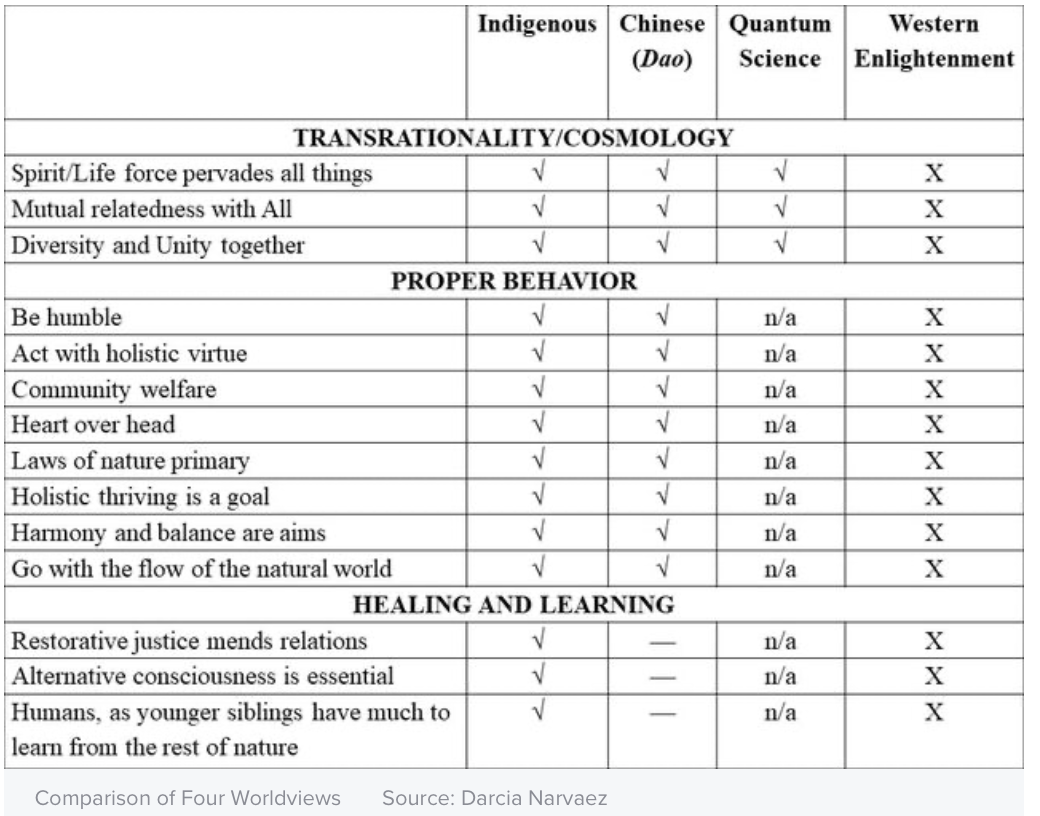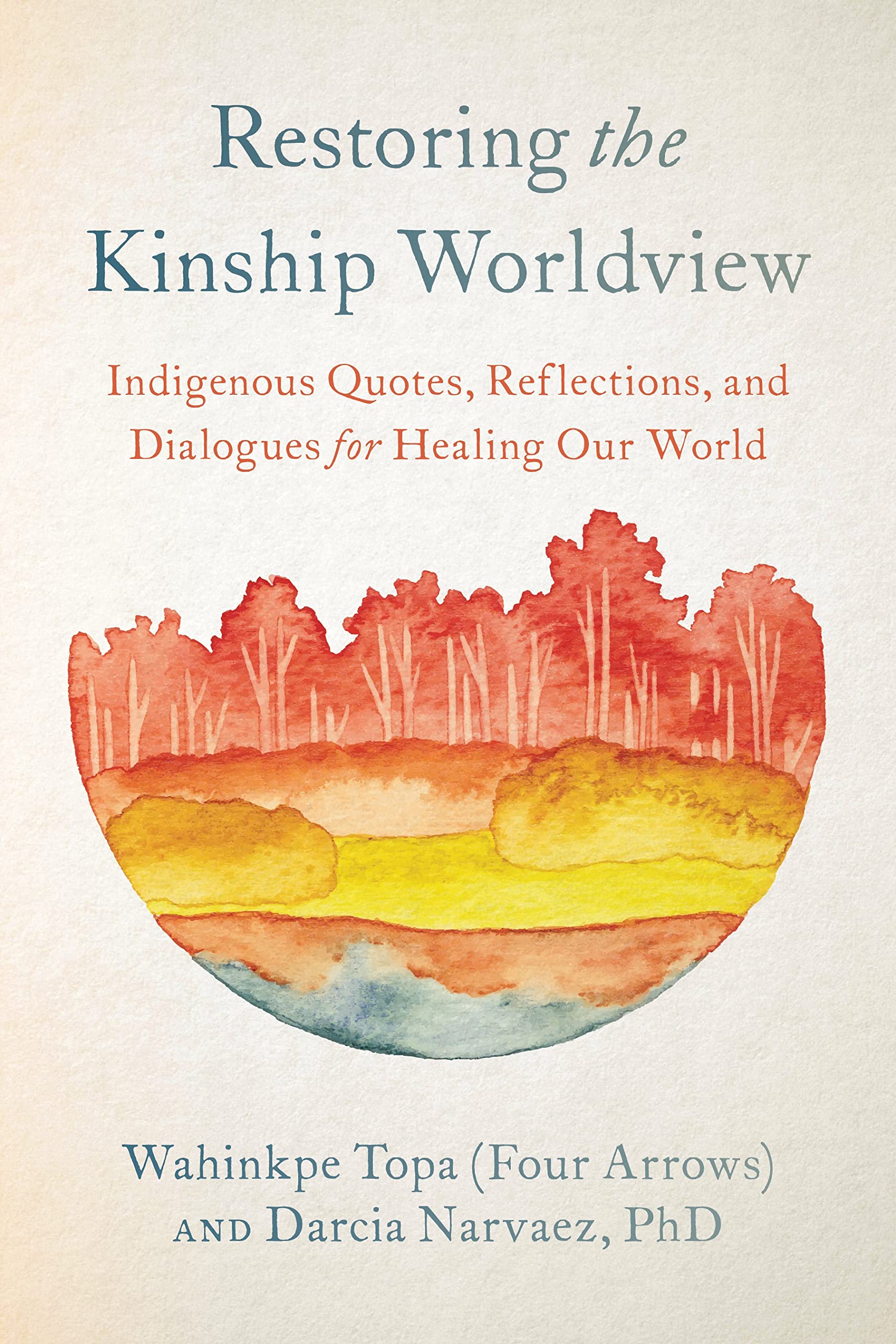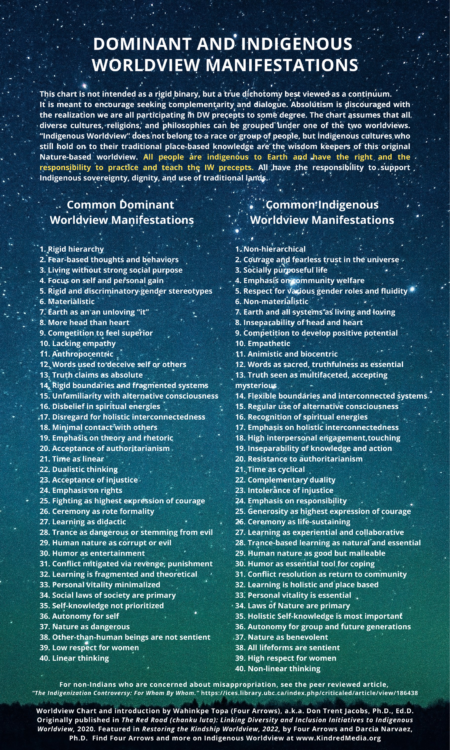Alienation From Our Living Earth Is A Recent Phenomenon: What Our Western Worldview Is Missing
Desired learning and behavior leave out traditional values.
KEY POINTS
- We are immersed in a life-alienating culture.
- Alienation from the living earth is a recent phenomenon.
- Cultural disconnection has roots in early psychic disconnection.
As the table below shows, the Western Enlightenment view that governs implicit assumptions in Western cultures today falls outside of traditional views across the world (Indigenous), Chinese Daoism, and even, where relevant, cutting-edge quantum science.

The Indigenous Worldview was universal at one time and is still visible in traditional First Nation societies (Four Arrows & Narvaez, in press). The Chinese Daoistic perspective emerged during the Axial Age (8th to the 3rd century BCE; Armstrong, 2007), when several of the world’s major religions/philosophies were established. The quantum mechanics view was first named in the twentieth century. The Western Enlightenment view was initiated in the 17th century.
The Western Enlightenment view governs not only implicit assumptions in western cultures today but the views of elites in societies that have been subjected to westernization/globalization from the expansion of predatory capitalism and extraction that profits the few at the expense of the many (Shiva & Shiva, 2020).
The Western Enlightenment view ignores or dismisses a pervasive life force, instead focusing on measurement of material things (De Quincey, 2005). The world is assumed to be full of separable, unrelated objects. There is also a tendency toward monoculture, one way to think and be—Western, materialist, ego-focused—because that is the way the world was designed: for competition among individuals and groups and the takeover by the ‘fittest’ individual or Christianity.
Expected human behavior according to the Western Enlightenment perspective involves acting against others for self, Machiavellianism, domination of non-white, non-male entities like women and Nature (Moore, 2015). Dominance is the goal. It is not possible to thrive, only survive.
Because there is an assumed basic evil in the world and in humanity, punishment and suppression are the appropriate responses when people don’t obey the dominant order (McPherson & Rabb, 2011). Only materialist-focused ego consciousness is true and possible. Everything else is romanticism. The rest of nature is largely inert or dumb, a set of resources for human (white, male) ends (Moore, 2015).
How do people acquire the species-atypical Western Enlightenment view, especially since it was not part of our millions-year-old evolution?
Notice how the Western Enlightenment view involves disconnection at every level. Disconnection from the goodness of self, from the impact and importance of relationships, from the livingness of earth entities. It is socially and ecologically blind.
Notice how it relies on dominance hierarchy, a chimpanzee characteristic that humans evolved away from (Burkart et al., 2009). In humans, a domination orientation is a sign of underdeveloped social skills. It is a sign of stiff-mindedness, poor executive function development (Goldberg, 2002).
All told, the missing characteristics in the Western Enlightenment view show a lack of perceptual, social ,and cognitive capabilities.
How do such capabilities normally develop in an individual? From being immersed in a family and community where such human capacities are practiced, experienced and expected. Our evolved nest provides a milieu where such characteristics are evident (Narvaez et al., 2019). Our human heritage is egalitarianism, which appears to come about from group motherhood and the ongoing control of ego inflation (Burkart et al., 2009; cite).
In recent centuries, the evolved nest has been degraded. In early life, a degraded nest affects males much more than females because of less built-in resilience and slower maturation during the period of rapid brain development (Schore, 2017). Undernurtured boys will be less connected, less socially skilled, less empathic and communal than well-nurtured boys (Turnbull, 1984). They will need to rely on built in survival systems because they will not have grown the complexity of skills needed for egalitarian living.
Patriarchal systems (hierarchies that minimize mothering/nurturing) have been undermining human development for millennia (Eisler & Fry, 2019). For example, English boarding schools started in 597. The mistreatment in boarding schools over centuries seeded social disconnection and self-protectionist morality (boarding school syndrome) that spread across Western empires and their colonies (Schaverien, 2015).
References
Armstrong, K. (2007). The great transformation. New York: Anchor Books.
De Quincey, C. (2005). Radical knowing: Understanding consciousness through relationship. Rochester, VT: Park Street Press.
Eisler, R., & Fry, D.P. (2019). Nurturing our humanity. New York: Oxford University Press.
Four Arrows, & Narvaez, D. (in press, 2022). Restoring the kinship worldview: Indigenous voices introduce 28 precepts for rebalancing life on planet earth. Berkeley: North Atlantic Books.
Goldberg, E. (2002). The executive brain: Frontal lobes and the civilized brain. New York: Oxford.
McPherson, D.H., & Rabb, J.D. (2011). Indian from the inside: Native American philosophy and cultural renewal, 2nd ed. Jefferson, NC: MacFarland & Co.
Moore, J. (2015). Capitalism in the web of life: Ecology and the accumulation of capital. London: Versa.
Narvaez, D., Four Arrows, Halton, E., Collier, B., Enderle, G. (Eds.) (2019). Indigenous Sustainable Wisdom: First Nation Know-how for Global Flourishing. New York: Peter Lang.
Schaverien, J. (2015. Boarding school syndrome: The psychological trauma of the ‘privileged’ child. Routledge.
Schore, A.N. (2017). All our sons: The developmental neurobiology and neuroendocrinology of boys at risk. Infant Mental Health Journal, 38(1),15-52. doi: 10.1002/imhj.21616
Shiva, V., & Shiva, K. (2015). Oneness vs the 1%: Shattering Illusions, Seeding Freedom. Chelsea Green.
Turnbull, C.M. (1984). The human cycle. New York: Simon and Schuster



